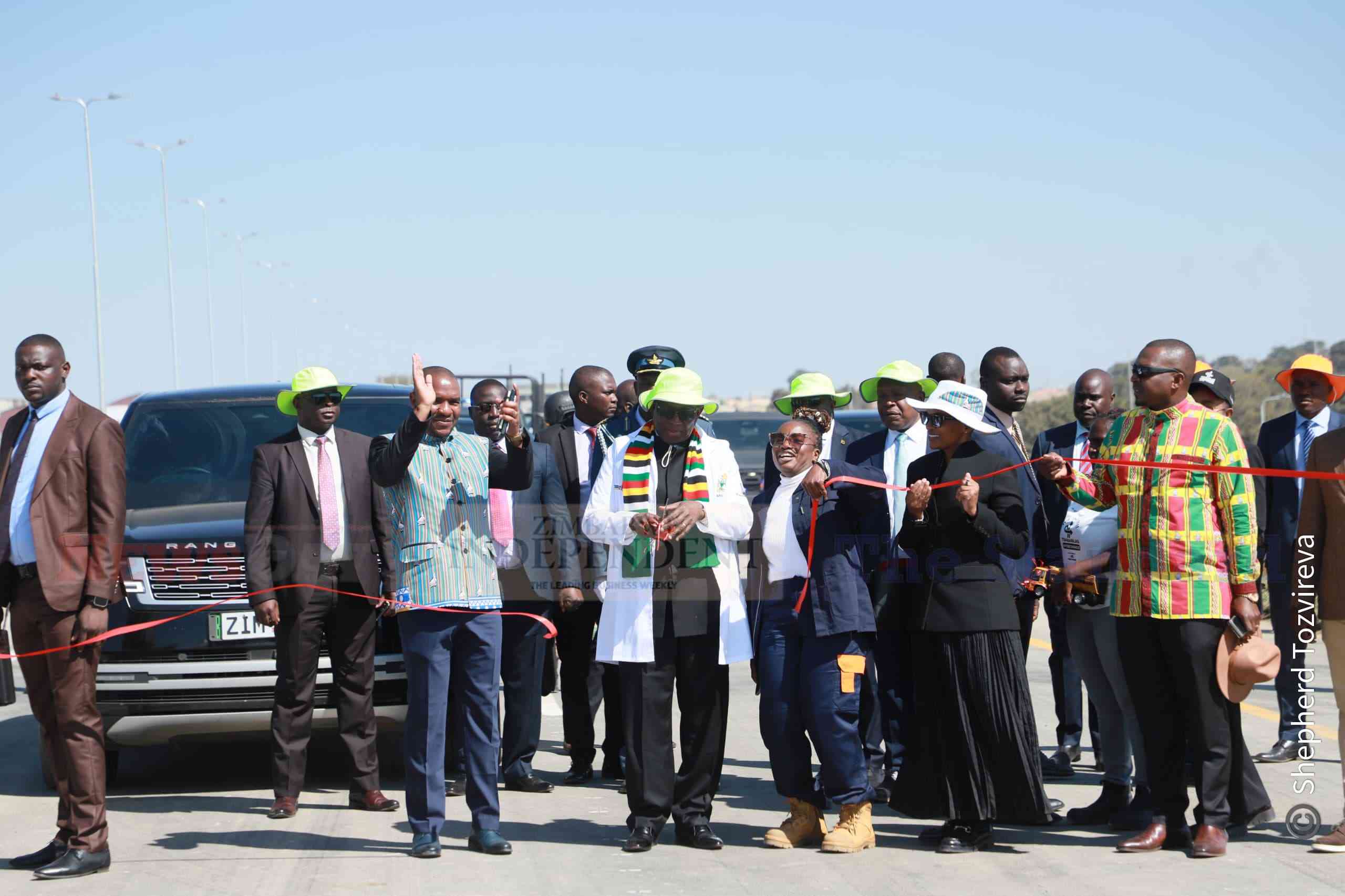
YESTERDAY, President Emmerson Mnangagwa officially opened the Trabablas Interchange, an US$88 million infrastructure project that changes the north-south traffic flow in Harare.
However, little has been said about the cost and how future generations have to pay for it.
It is a fact that the interchange will change the skyline of the once Mbudzi roundabout, traffic will flow easily through the old bottleneck that used to give motorists a nightmare.
The project was implemented by a local consortium, Tefoma, made up of Tensor Systems, Fossil Contracting and Masimba Construction.
It became one of the first and biggest construction projects entirely implemented without a foreign company’s involvement.
The project should be celebrated, but for a moment, we should pose and critically look at the unsustainable funding model of the project.
This is one project that has substantially added to Zimbabwe’s sovereign debt, now at US$21,7 billion.
It is arguably one of the most inflated construction projects since the advent of the second republic ushered in by the November 2017 coup.
- NoViolet Bulawayo’s new novel is an instant Zimbabwean classic
- Jah Prayzah, Zanu PF rekindles ‘lost love’
- Bank workers appeal to Ncube for tax relief
- Indosakusa marks 21-year anniversary milestone
Keep Reading
Figures from the Treasury as of November 2024 show that the national debt has nearly doubled from US$12,8 billion before the coup.
Mnangagwa is happy with himself and his administration for completing this signature project.
He has even given it the queer name — Trabablas — one of his several nicknames.
In other words, Mnangagwa has immortalised his name, but at what cost?
The cost is frightening, US$88 million, a figure many construction analysts say is inflated for the benefit of the political elite and their proxies.
It has been argued, similar or bigger projects in other countries in the region like Botswana or South Africa have been completed at a quarter of what Zimbabweans will have to pay over the next decade plus interest.
Yes, Zimbabwean taxpayers have to pick the tab because the project was funded through domestic debt to be repaid in foreign currency.
It is interesting that the Trabablas Interchange was officially opened in the very same week Finance minister Mthuli Ncube and a coterie of civil servants were in Abidjan, Ivory Coast, negotiating a debt clearance package with the African Development Bank (AfDB).
The bank announced that it was hosting a Davos-style panel discussion on Zimbabwe’s Structured Dialogue Programme that looks at mobilising funds to pay off debts in arrears.
“Key stakeholders, including the bank’s shareholders, potential champion countries for bridge financing and representatives of compensated former farm owners, will play a central role in this critical initiative,” the AfDB said in a statement.
There we are, Zimbabwe going cap in hand across the world begging for funds and debt relief yet back home celebrating “supposed local-funded” infrastructure project.
To add to the irony, Ncube at the briefings in Abidjan told the world that he had devised a plan to raise an incredible US$15 billion from giving resettled farmers title deeds.
Yes, US$15 billion. Someone should have reminded Ncube that the global amount to compensate dispossessed white commercial farmers is a mere US$3,5 billion.
So why can’t Zimbabwe settle this without outside assistance?
The answer is simple. Zimbabwe has very poor procurement procedures.
It pays inflated invoices. It awards contracts without taking due diligence in the tendering process or even going through public tenders.
And finally, it pays companies in advance and most of them fail to deliver the goods.
Procurement Regulatory Authority of Zimbabwe chief executive Clever Ruswa in March this year told the Zimbabwe Independent that ministries, departments and agencies have sent US$19 billion in procurement since 2018, yet there is very little to show for all this money.
Zimbabwe has spent billions on emergency road rehabilitation programmes, COVID-19 vaccines, purchase of vehicles, Presidential Goat Scheme and the August 2024 Sadc Heads of State and Government Summit luxury villas still to be completed nearly a year after the meeting.
The above are immediate examples of wasteful expenditure that have added significantly to the national debt that taxpayers now and in the immediate future have to pay.
Oops, I had nearly forgotten the inflated US$1,5 billion paid out to “private investors” who cashed-in their 35% shareholding in Mutapa Investment Fund-controlled Kuvimba Mining House.
This is the sad reality about public finance management under the second republic.
This is what it would be remembered for by future generations and those who cannot retire at 60 today because the economy is in turmoil and their pensions would be peanuts.
Therefore, they would rather die working than living in penury.
It is not late in the day for Zimbabweans to start demanding for a forensic sovereign debt audit.
A lot of skeletons will tumble out of the cupboards.
The audit should go further and pierce the corporate veil of the companies that were given large government contracts without going to tender.
The beneficiary owners should be known.
In the same vein, parliament should have a spine and start holding to account the members of the Executive and heads of departments and State agencies.
Parliament should refuse to be a mere rubber stamp of costly Executive decisions.
Parliament should refuse to be abused like when it passed the Reserve Bank of Zimbabwe Debt Assumption Bill in 2015.
This Bill turned resettled farmers’ private debt into public debt, yet today, they still hold on to the farms and farm implements they received for private gain.
This socialism for the rich and politically-connected should be vehemently opposed.
This has been the tragedy of the second republic, turning public finance into a feeding trough for zvigananda (leeches).
Politics should enhance the lives of the many, not the few. This lesson should be deeply ingrained in every patriot.
Trabablas interchange for the majority poor next to it will remain a classic class segregation.
Most will never cross the road like they used to do when it was a roundabout, but will see the luxury vehicles and freight trucks zooming past.
Yet, they will pick the tab to pay for the development.
That is what Trabablas will be remembered for, widening the gap between the rich and poor, yet at the same time increasing the tax burden of the poor.
- Paidamoyo Muzulu is a journalist based in Harare. He writes here in his personal capacity.










